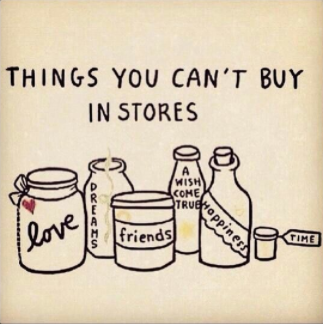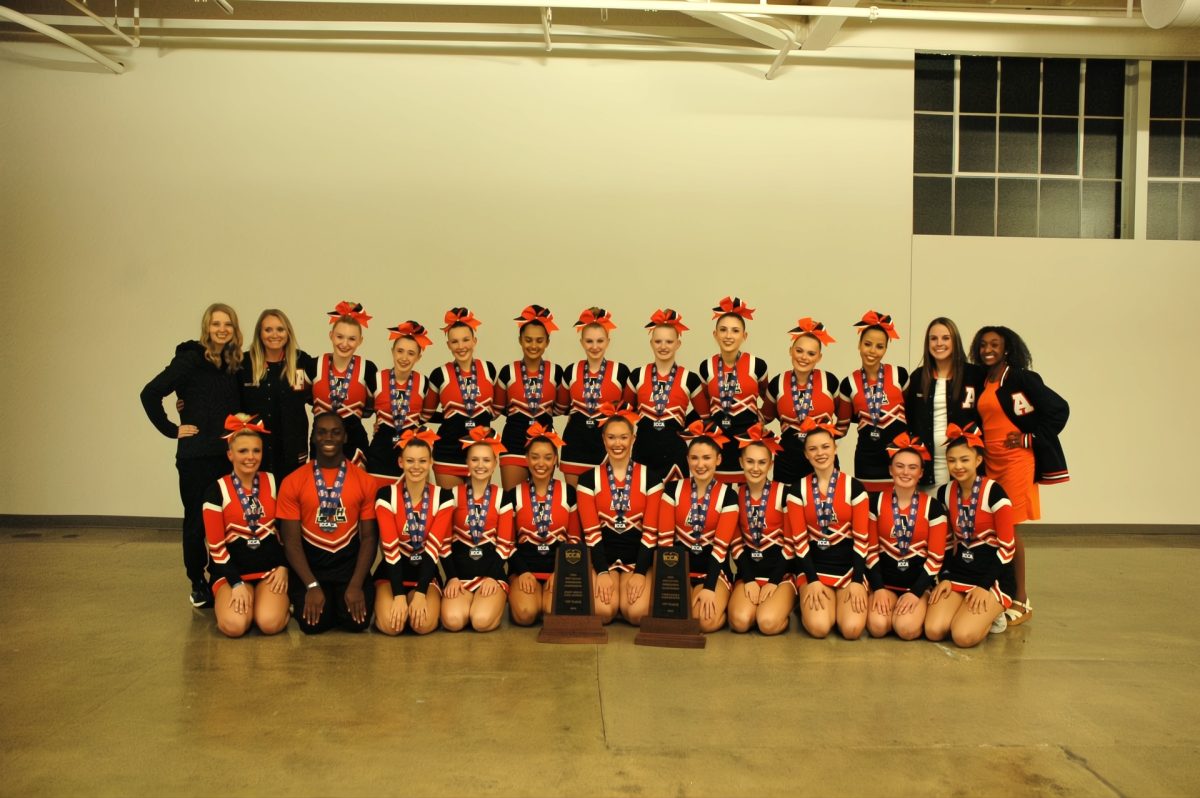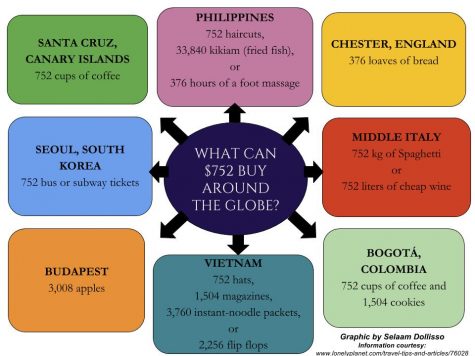Throwing Away Consumerism and Unwrapping Community this Holiday Season

December 13, 2016
Before embarking on this article, I had, like many others, a preconceived notion of the materialistic culture of Christmas in America- and rightfully so. According to Gallup, the average American household spends about $752 a year on Christmas presents. Through curiosity, I began to inquire what could be bought with $752.00 around the world. The graphic below gives some perspective on common, everyday items that can be bought around the world with the same amount of money that Americans spend on gifts; as you will probably notice- it’s a lot.
The United States has left its global counterparts in the dust when it comes to the size of its consumer market. According to International Business Guide, the American consumer market represents 29% of the global market. Second place on the list, Japan, doesn’t stand a chance; at 8.5% it’s almost exactly 20% behind the U.S. With a gap as enormous as that, it is easy to understand the drastic difference in values concerning materialistic possession in the states vs other countries, and how much power the U.S. has in influencing the trends of the global market.
That being said, excessive spending in the U.S. around the holidays (and other times of the year) does not necessarily mean that we as consumers are inherently selfish. I decided to ask a simple, unassuming question to several Ames High juniors, and there began the dissipation and contradiction of my previous assumptions:
If I gave you $752.00 right now, what would you spend it on?
The responses I received were were a pleasant surprise, as I thought the holiday spirit may cause the answers to be much more self-centered. This was not the case:
Isabel Ingram, Anna Stevens, Marin Ellis and Nicole Kreider, said they would donate their money to charity. Isabel said she would donate $252.00 to Global Fund for Women, as she is a strong believer of equality and progression for women. The rest, she said, would go towards her French trip and a small treat of chinese food for herself.
Similarly, Marin has seen the value of selfless acts since she was a child. She would donate all $752.00 to an organization called “World Vision” which she has actually donated to in the past.
“I would like to use the funds to benefit those less fortunate than I, both here in the U.S.A and abroad, whether it be through clean water, educational opportunities or materials, clothing, medicine, mosquito nets and much more.” She quotes Ralph Waldo Emerson: “To know even one life has breathed easier because you have lived. This is to have succeeded.”
Teresa Pelzer, Emily Helmer, Nicole and Anna (in addition to charity) would also put the money in savings or specifically save for college. Teresa also said she would save for a future vacation. Anna did, in fact, think about the holidays, however, she put her parents first: “I would buy my parents some dope gifts for the holidays because they do everything for me.”
Ben Eyles and Griffin Meyer didn’t quite follow the same trend as the ladies above. They both would spend the $752.00 on their cars, but have slightly different visions on how the money should be spent. Ben says he would pay off his car- a practical move. Griffin however, would apparently “install rims and purple headlights on [his] orange-red mom van.” I appreciate the 70s vibe, Griffin, but I have to say the visibility of purple headlights at night worries me.
Although it is, and perpetually will be, hard to detach the United States’ spending from acquisitive verbs, the people who live and contribute to our country’s success can not be typecasted into umbrella terms such as “greedy” or “ungrateful”.
There is no question that Americans of all economic standing are extremely privileged compared to those in many places around the globe, but that does not, however, mean that the sentiments of good-hearted people should be undermined.
Think about it this way. What do adults think of teenagers? If you said ungrateful, phone-addicted, hormonal creatures, *ding, ding* you are probably right. Yet the expressions of the seven students above show otherwise.
My intent was to talk about consumerism at Christmas, but it is important to understand that my message has made a 180 degree shift to community. Disable your assumptions. Everyday we judge others without even getting to know them. That is precisely the reason why Americans are known to be very standoffish and keep social interactions to a minimum.
Of course we are going to be labelled as greedy or unsympathetic if we keep our feelings bottled up and hasten our greetings to be less sincere. Just as you may judge someone to soon find out how amazing, intelligent, and sensitive they are, the amount of U.S. spending and commercialism- however daunting- is not an indicator of the disposition of its citizens.
As a child of immigrants from Ethiopia, I have had my fair share of cheek kisses, warm-welcomes, and being told to eat repeatedly, even after telling the dinner hosts that my food baby and were more than stuffed.
My parents can attest to the much colder vibe they got upon their first years in America compared to the tight-knit community in their childhood homes- even though they know that the majority of Americans are great people. I don’t say this to be offensive or accusatory, I have to work on this myself. I bring this up for the purpose of discussion and inspection of our close-minded and mouthed society. So, why exactly is this?
Take cover folks, I’m going to be blatant: Americans have a heart, you just have to stick around long enough to hear them. It is important that we stop taking cover in the screens that have become such a warm and inviting shelter. Talk to others, engage in meaningful conversation, develop a strong sense of empathy and a vigorous drive for justice and learning. This, I believe, is the key to breaking walls, diminishing ignorance, and helping the world evolve into one that is happy and healthy in all aspects.
This holiday season, don’t worry about how much you spend on gifts, focus on how much time you spend with the ones you love. We only have one life: I would like to live knowing it was sincere.
“Many people are so poor that the only thing they have is money.”
― Rodolfo Costa, Advice My Parents Gave Me: and Other Lessons I Learned from My Mistakes




























